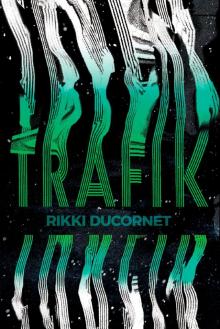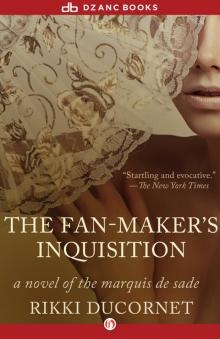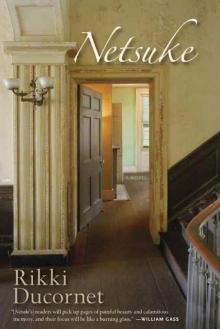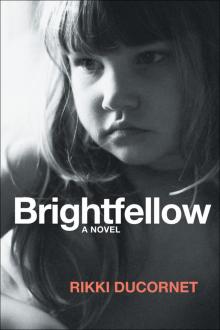- Home
- Rikki Ducornet
Brightfellow
Brightfellow Read online
Copyright © 2016 by Rikki Ducornet
Cover photograph © George Marie
Cover design by M D’Alessandro
Book design by Rachel Holscher
Author photograph © Jean-Yves Ducornet
Coffee House Press books are available to the trade through our primary distributor, Consortium Book Sales & Distribution, cbsd.com or (800) 283-3572. For personal orders, catalogs, or other information, write to [email protected].
Coffee House Press is a nonprofit literary publishing house. Support from private foundations, corporate giving programs, government programs, and generous individuals helps make the publication of our books possible. We gratefully acknowledge their support in detail in the back of this book.
Library of Congress Cataloging-in-Publication Data
Names: Ducornet, Rikki, 1943– author.
Title: Brightfellow / Rikki Ducornet.
Description: Minneapolis: Coffee House Press, 2016.
Identifiers: LCCN 2015037489 | ISBN 9781566894418 (eBook)
Subjects: | BISAC: FICTION / Literary. | FICTION / Psychological. | FICTION / Coming of Age. | FICTION / Romance / Gothic. | GSAFD: Bildungsromans.
Classification: LCC PS3554.U279 B75 2016 | DDC 813/.54—dc23
LC record available at http://lccn.loc.gov/2015037489
Acknowledgments
Part 1 of Brightfellow appeared in Conjunctions 63: Speaking Volumes, 2014. My thanks to Rick for the books, the ink; Linda for the pens, the walks in the woods.
23 22 21 20 19 18 17 16 1 2 3 4 5 6 7 8
For the Lannans, the month
at Marfa where this book
begins. For my son, his creative
spirit, his courage.
I was off and not a soul was aware. For it appeared to all that I was still among them, upon my little bed, rapt in child’s play.
—Patti Smith, Woolgathering
Contents
ONE
TWO
FUNDER ACKNOWLEDGMENTS
ABOUT THE AUTHOR
ONE
THE LINOLEUM SWELLS WITH STORIES. As he plays, darkness rises from the floor and slowly claims the room. Outside, a heavy rain falls and then it ends. Outside, the world spins, and he is the only one alone.
He cautiously steps from one island to the next. Cautiously! His feet are bare and small. Sometimes he considers them with curiosity. He doesn’t know he’s beautiful. He doesn’t know he’s lonely and that his fear is not of his making, that it will haunt him for the rest of his life. It will impede him years from now—twist and turn him just as an incessant wind twists and turns a tree—just as it will in unexpected ways nourish him. Yes: it will both nourish and impede him. And this is a terrible thing. How can he undo such a tangle?
The damage, already there, is subtle. As is its progress. It reaches for the future like smoke. The world bends beneath the weight of such malfeasance. There is a smell to it, a flavor and a mood, a familiar weather. Although he is six, only—six!—he is accustomed to it. It is the atmosphere that sustains his tirelessly imagining mind. Oh! How tirelessly he dreams! He cannot know it, but already he yearns to live richly. That is to say deeply and with excitement. He is thirsty but it does not occur to him to drink.
To begin: it is late in the day. Early evening. And he is alone. He is a good child, far too good for his own safety. The house is in shadow, the woods beyond in shadow, and behind his door, the familiar rooms all are in shadow. One day the word penumbra will appeal to him. But he is too small now to know it. He plays at explorer. It is his way of claiming and knowing those charmed islands that burn so brightly in his mind. Here, he says, his head tilted to one side, are antelopes. (Antelope—a word he loves.) Parrots in the trees. Parrots with beaks made to crack nuts, and with wings strong enough to master hurricanes. He draws a breath, and crossing over to the next island, the island of elephants, blows it out. Trumpeting elephants, their toes fused together. And snakes! Even more beautiful than the garter snakes that live in the backyard where the sumac grows. More beautiful than the copperheads that rule the woods where he walks sweeping the paths with a stick just as if they were planted with explosives. Poised on one foot he says: Be careful. Again he dares confront the linoleum’s treacherous waters. Giraffes, he nods, greeting them, coming to rest. Solidly planted and still, he looks at the world around him. The islands are all alike, gold-colored blossoms floating on an indigo sea. Volcanic islands with lakes, caves, quicksand. How he loves these islands! These epic journeys!
There is an archipelago that begins under his bed and goes all the way to his door. It shines with beauty and danger. There are flowers that have voices and sing to children. There is a poisonous toad that speaks in riddles, and the wrong sort of snake, thick as a chimney, concealed in the dappled light. Beyond the door is the bathroom he needs to visit but dares not, as well as the kitchen, his parents’ mysterious bedroom (a place of disquiet), the living room, the small dining room where he likes to draw pictures because the table is so big his crayons can’t roll all the way to the edge and fall to the floor. Crayons, he thinks, are like baby snakes in rigor mortis (his mother’s words).
But the linoleum. It’s risky. If he continues this way, naming the mountains and the animals, he might wander too far, might not find his way home. The sea is black, the islands dimmer by the second. The yard outside, every room in the house, have surrendered to a night lit, but barely, by a moon broken in half.
Island by island he must step to the light switch and turn it on, but it’s so dark he can barely see where he is going. He might take a wrong turn and tumble onto a star headed for Mars. He really needs to pull himself together now and make his way to the light switch. And the bathroom after.
A car passes, briefly filling the room with light. The light is like an eye searching him out. But he has been good, hasn’t he? There is no reason to be afraid. The switch is within reach when he stumbles and with a cry falls to his knees. He touches the floor. Dry land!
A door slams, his mother’s voice calls his name. When he reaches the light the first thing he sees is the door’s little brass head. He thinks that the doorknob must be the door’s head even if it is in a funny place. And it has his face.
Sometimes when he is alone in the house he hears voices, her voice, so he is not certain it is her voice now. Or if the steps coming down the hall toward him are hers. Or who she will be, his mother or the one he dare not name. “Stub?” she calls out from the hallway, “Stub?” The little face on the door turns; he watches it turning and she’s there, his mother, bending to hug him, saying: Poor little fellow in the dark, dark house all alone!
She dispels the shadows, all of them; it is astonishing, the radical shift that takes place: the world is back on track—a thing she likes to say. Back on track for now and maybe forever. And there will be Chinese noodles. The boxes are on the kitchen counter, and a hard head of lettuce, the sharp kitchen knife, the green and white crockery from Mexico. When she’s in a good mood she says: Let’s put some crunchy crackers on the crockery and chow down. And he will laugh; he will be one with laughter. If you could peel him like an orange you would find laughter all the way through. (This is how it should be; why isn’t it always like this? Chinese noodles and crackers and crockery and caresses and laughter from the top of his head to the tips of his toes.)
She is so beautiful he wishes he could scramble onto her lap, but she’s leaning over the kitchen table with the green and white dishes painted with leaves, so round and pretty they make him glad, like a cat that has had its milk. Or a tree in the early morning full of singing birds. This is what her magic does to him, her white magic.
His mother has a radio show. It is strange and maybe wonderful how she fits inside t
he little brown box. His mother, her square face, her round bottom, her funny hair, her wool suit, her high-heeled shoes, her entire brain and voice, her tongue and teeth, her laughter and her shouting—it all fits in there like a slice of bread in a toaster.
There is a thing he knows: food made with love is hot. Scorching when it went into the white paper boxes, the food is still hot. Tonight his mother is a good fairy, her eyes sparkling behind her glasses. She looks nice and talks easily about the mysterious world she visits when she is across the river in Kahontsi. He relishes time with her. In the morning she will leave for work dressed in tweed. A silly word like Tweedledee. When he thinks of tweed, he imagines his mother going to Kahontsi on roller skates. But instead, off she bustles in her little leather pumps, her frizzed hair tight on her head, makeup served upon her face like a fried egg on a plate, and he is overcome with admiration and disdain.
Her face is much better in the morning before she paints it. There are little creases beside her blue eyes and a blue mole on her upper lip. Her skin is soft, not sticky. Saturday and Sunday she is lazy; the mornings unspool languorously. The house smells of coffee. When his father is home it smells of bacon and eggs and French toast, and Stub doesn’t notice that the linoleum shuts down and stays that way, its secret life silenced. Silenced, too, her sudden anger that pummels him like a black rain.
His father has never raised a hand to him, nor his voice. Once, only once, he lost his temper, and ran after Stub to punish him. But Stub ran faster and his father, a heavy smoker, stopped in his tracks, panting, empty of anger, sucking on air and laughing. Then they were both flat on their backs laughing together. Rolling around on the grass like caterpillars, said Stub.
It never occurs to Stub that his father does not know that sometimes his mother shakes him so violently his teeth rattle like marbles and his heart thrashes like a fish in a bowl of ink. That there is a bad mother, a good mother—like a planet and its moon spinning together, rising and falling, the one eclipsing the other. He knows his father will never purposefully hurt him, knows this in his bones, and then there is this other thing: the family. The shape, whole and good, they make together. Whole and good but also bad, a world of shadows, danger at its heart.
Always his father comes home late, and even if Stub is fast asleep, he strides into his room easily, islands and oceans falling away, he might as well be levitating, floats to the bed, kisses Stub on the cheek. This kiss floods the moment with promises Stub knows his father intends to keep.
Once his mother said to him: You sleep with your mouth open, your hands crossed over your chest like a corpse! He sleeps like a corpse stiff as a snake in rigor mortis.
Sometimes when she turns on the radio to hear her own voice he resents it.
Sometimes when the snow falls she says: How I love weather. And he loves her for it. Loves her so much his heart blooms like a tiger lily and he roars his happiness; he roars and runs about and his pleasure delights her. In these moments their friendship is secure, eternal, luminous; their friendship rings the hours. These words of hers give him hope; he, too, loves weather, the safety of seasons, each bringing a gift: snow, rain, sun, wind. But because he is a dreamy child, fall is his favorite. Perhaps it reflects the best moments of family life: days of color, of clement weather—and this before the first mornings of heavy fog; the first blizzard when the sky is wiped away and the sun dissolves in brine; the first ice storm, one of many, when he can hear the world outside shattering.
If he looks like a corpse when he sleeps, does this mean he will die in his sleep? Sometimes he pokes his gums with a pencil to make them hurt, to make them bleed.
Someone is coming to live with them. This way he will never be alone again in the evenings. When the bus brings him home, Jenny will be there to look after him. She was living in the madhouse, the one off the highway just a few miles away. The madhouse where people who are on their way to health and feeling better sit on the front porch in rocking chairs watching the cars go by. He has seen them rocking back and forth. Perhaps he has seen Jenny on the porch from the school bus window, rocking and sniffling and thinking, or chewing gum or smoking. Is she thick, ugly, and sad? He once saw a lady who had hair like dead mice glued to her head. And another one, all nerve and bone (his mother’s words) with a great red nose sticking out of her face like a swollen toe. No, says his mother. Jenny is pretty, thin as a pencil with hair like yellow string. Tonight when his father comes home he will bring Jenny with him. She will live in the spare room. She will stay in the spare room, not wander, except when invited elsewhere, such as the kitchen, or when they are alone together, playing in his room. And she will cook for him. During the day when he is at school, Jenny will be at work washing dishes. He wonders if she will make sandwiches. She will. And macaroni. Meatloaf. All the things he likes. Will she tell him stories? She will. Where does she go to wash dishes? Annie’s. Up the way. Jenny likes to put her hands into hot soapy water. Soapy water is what she likes better than anything. When she comes to live with them, she will wash her hands over and over and Stub will fall asleep to the sound. Jenny’s hands thick with suds like sheep’s wool; he will lie in bed listening. Clocks will dissolve and the passage of time will take on the shape of a heart. Stub will think: That is the sound of sweet Jenny washing her hands. She is on the mend but she is still crazy, sort of. And this is how we know: the suds filling the sink night after night like lambs.
Here is how Stub dreams of Jenny:
He dreams that she is shearing wool and that the wool accumulates around her in drifts like snow. When his mother’s voice hatchets into the room and he awakens, he knows that he has glimpsed something both true and mysterious.
He dreams again. Of Jenny standing in the foam of the ocean; it froths like boiling milk. She has a cup in her hand made of silver; it’s Stub’s cup, the one he had as a baby. Jenny dips it into the foaming sea and offers it to him. It tastes like milk sweetened with honey. When Stub awakens, every hour of that day is diaphanous.
One afternoon when Stub has returned from school and the orange bus has vanished behind the hill, and he is in the kitchen with Jenny eating gingersnaps, he hears his mother’s voice on the radio and puts his hands over his ears. We can turn it off, Jenny says, and she does. The delicious aroma of subversion fills the room, and Stub radiates within a cool plume of light. How easy, he realizes, to shut the box off! That day something happens that greatly matters, something good but also dangerous. And funny. When Jenny turns the knob and he laughs out loud, she joins in.
Later she asks to see the book he loves best. He brings her Little Black Sambo Lost at Sea. A beautiful book packed with pictures and thick, black letters. Jenny loves letters. She says that when they collide into one another they are like animals that change shape before your eyes. They leave tracks across the page. They are round, soft, thorny; they have edges. The letters come together, she whispers right into his ear, in order to delight, to derange us. They come together, they hold hands, they caress, they bruise one another, they force the soul down deeper, they make us thirsty for unimaginable things, they shake their limbs and dance, the page is their stage, they make music, see: that h looks like a harp.
“Is it true,” Stub whispers into her ear, “that they burned a hole into your head?”
“Yes.” She whispers back. “There was an intruder, a poet, I think, sitting inside my head on her very own chair! So . . . someone thought to . . . someone thought to . . . look!” And she points to another letter, like a person, wanting to say hello.
Little Black Sambo is sitting on a big box of oranges floating in the middle of the sea. “O!” he says. “Good thing I’m sitting on this box of oranges!” If you close your eyes, Jenny says, leaning closer, and think about that letter O, you can smell the rind and see the seeds inside. The box is tied with string, which is why it has an X. And see the nice, mouthy O in the middle. Big enough to swallow an orange. Skin and all. A good word, box. It has so much room inside.
When in the mornings the school bus comes, Jenny is there to say good-bye. She squeezes his hand; hers is long and cool and friendly. Her fingers are very clean, cleaner than anyone else’s. And soft. They smell of almonds. Her eyes are green and strange, flecked with gold dust and cacao. Her hair floats around her face like yellow string, just as his mother said. Jenny is beautiful, dressed for work in sneakers and a gray cotton dress. She wears a brown wool cardigan because the day is nippy. She says: When you get back I’ll be here. To be here always is my intention.
In school when his teacher asks he tells her: Mommy is in the radio and Daddy sells seeds. He goes to people’s houses door to door. Flowers, he tells her: marigolds and pansies (which means “thinking of you” in France). Vetegebles, too. Vegetables, she corrects him. He says: Radishes. Pink ones, red and white. Even black ones. I’ve never heard of black radishes, she says. Tell your daddy I’d like to buy a package of those black radish seeds.
This is a day unfolding unlike any other. The sensation of Jenny’s hand in his own and his teacher’s interest in his father’s radishes. Then in the afternoon when the bus stops beside the path that leads to his house, Jenny is out front feeding crackers to the ants that live everywhere. Not just under the front porch. Ants, she tells him, like a parade. Ants, she continues, have built a city under the porch, a fantastic city of sand with towers and pyramids and map rooms and museums. They live in the dark; ants have noses for eyes. They sleep under the best smooth stones. There are corridors, more than anyone can count; ants don’t have doorknobs. They fear anteaters. Ant-eating birds. Little boys who do cruel things with mirrors. Understand, she says, that this is a warning. He assures her he loves the ants, too.
At the center of the ants’ city, there is a park and a long table set for community suppers. The plates are made of toenail trimmings people have left unattended on the bathroom floor; the ants go into the house just as soon as people leave to look for them. They look for the things people have abandoned in corners, under the living room couch, behind the crockery, in the breadbox, between the pages of books, in the deep creases of the upholstered rocker, in his father’s sock drawer—My father’s sock drawer! Stub explodes with laughter. And the pantry. Jenny picks up a twig and pushes it around in the grass. Above all, the pantry! Grain by grain they make off with the sugar, the flour, the honey grahams and gingersnaps, the lost buttons. Lost buttons? Yes. A button is a fantastic weapon when you are an ant. When the ants go to war it might look like a game of tiddlywinks to you and me, but a button sent flying into an anteater’s eye will send it packing, let me tell you.

 Trafik
Trafik The Fan-Maker's Inquisition
The Fan-Maker's Inquisition Netsuke
Netsuke Brightfellow
Brightfellow